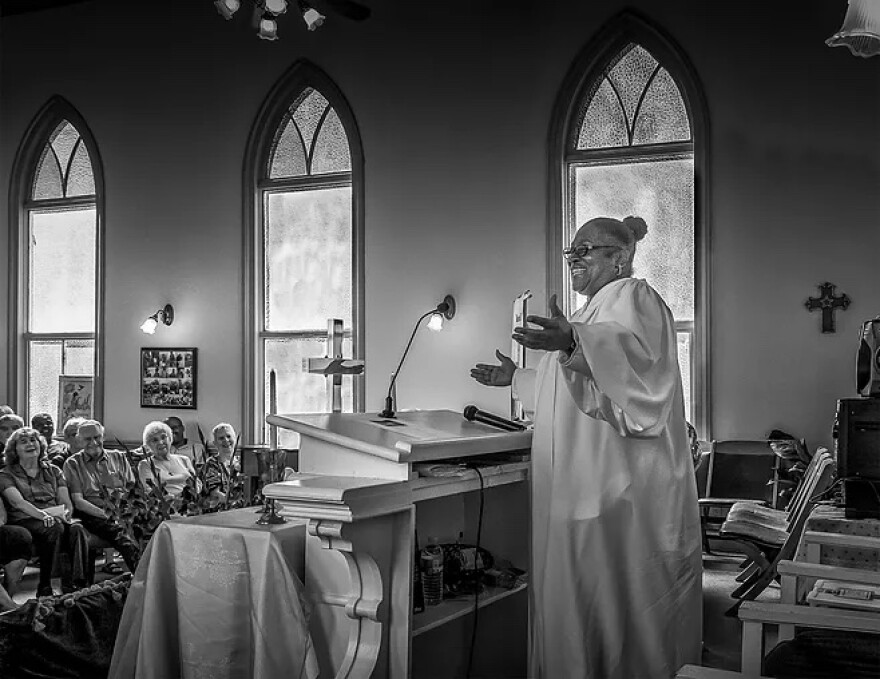Last week in the series, Dr. Johnson spoke about implicit bias and how it can be deadly. Find that episode HERE.
In this week's episode of conversations on race, Dr. Lesa Johnson spoke with NSPR’s Adia White about her research on the fifth district of the African Methodist Episcopal Church (AME). The fifth district stretches from Missouri to California and the project is called “From Wander to Wonder: Surviving Pastoral Exile to Thriving Pastoral Excellence.”
On some of the goals of the project
What we are doing is trying to understand this particular district’s situation with pastors. We recognize that there is a decline in the number of candidates for pastoral ministry, we recognize that there's an increased percentage of older candidates accepting the call to pastoral ministry. And what that may mean is that they are bi-vocational. And so the ministry ends up being their second career, which is not necessarily a bad thing, because another thing that we recognize is, like many Black institutions in the United States, there is a dearth of funds or support for Black ministry.
Many of our pastors may indeed need to be bi-vocational, particularly if they are serving rural churches or smaller churches. Another thing that we notice is that there is a dearth of youth, or young presence, in all levels of church membership. And then the fourth thing that we noticed was a resistance to any type of creative or progressive engagement with some of the most pressing social challenges of our day, which is another reason that young people are not really attracted to the Black church.
The Black church was, and particularly the AME church, established out of a need for social justice. But what we recognized was that for some reason, Black churches strayed away from social justice initiatives. We wanted to understand if that really was going on. In other AME churches, we saw it going on with some of the things that we experienced, but we didn't want our own experience to be the clouding judgment for Black churches. We really needed to look at this on a broader swath.
On the personal significance of this research project
I have always been religious ... or spiritual. I know, for some people, there's a very stark difference between religiosity and spirituality. But I was raised in the church. I was raised in the United Methodist Church, then I left. And then I came back to the AME church after the Charleston nine — I was in graduate school at the time. I was doing research on social support for economic mobility of Black women, and I recognized that the church came up so often. Even in that research, because the church has so much of a support (system) for Black families when other institutions in the United States seem to fail them. So for instance, when African Americans are quite resistant to seeking mental health help, they go to the church and they talk to the pastor or they talk to the lay leader. And the Black church has always been set up to sort of make up for the things that Black people could not get in mainstream society.
On the number of churches included
Our initial study was a quantitative survey that was established and given to around maybe 130 - 450 people across the states, asking them basic questions about what their churches were involved in, how they engaged with the church, and this was basically church pastors and lay leaders. So we were asking them how they got along, how their finances looked, how their membership looked, things of that nature. So that was the first year’s study.
On how the research was conducted
It's been remote. I have been a member of the Bethel AME church in Chico. That church has been remote because of COVID. Because this started during the pandemic. A lot of what we are dealing with is about how the Black church deals with COVID, how it deals with something like a global pandemic. How the church may respond to the vaccine, and whether or not members or leaders believe in being vaccinated or trust in the health care system, because of our history — the healthcare system’s history with us. So a lot of it is about engaging in just regular everyday, concerns of Black parishioners.
On the lack of resources for churches in rural communities, such as Chico
The Chico church has 25 members. Imagine running a whole ministry with 25 members, having to keep the lights on, having to pay a pastor, having to pay for the pastor to go to conferences. If you have a church with 25 members, that means that a bi-vocational pastor will end up paying to be a pastor, rather than being paid to be a pastor. That then ends up flowing through to how they care for their families because they're not going to get reimbursed for a lot of the things that they do in the church.




